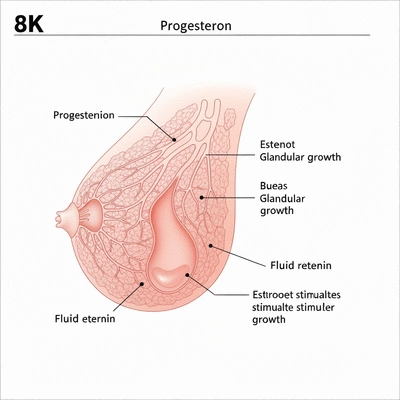Breast Tenderness and Birth Control

Understanding the effects of hormonal birth control can be a game-changer for your health. Did you know that many women experience breast tenderness due to hormonal fluctuations? Recognizing these changes not only empowers you but also allows you to make informed decisions about your body.
What You Will Learn
- Hormonal birth control affects estrogen and progesterone levels, leading to potential breast tenderness.
- Understanding the link between your menstrual cycle and breast sensitivity can help in managing discomfort.
- Breast tenderness may vary throughout the month, often correlating with hormonal peaks.
- Being proactive about tracking symptoms can facilitate better discussions with your healthcare provider.
Understanding Hormonal Birth Control and Breast Tenderness
This visual outlines how hormonal birth control influences hormone levels (Estrogen & Progesterone) and their subsequent impact on breast tissue, leading to varying degrees of tenderness and related symptoms.
Step 1:
Hormonal Birth Control's Influence
Hormonal birth control introduces a steady dose of Estrogen & Progesterone, altering natural cycle rhythms.
Step 2:
Altered Hormonal Fluctuations
Natural peaks & valleys are smoothed, leading to more constant (but not always lower) hormone levels.
Step 3:
Breast Tissue Response
Estrogen and Progesterone facilitate glandular tissue growth and fluid retention.
Step 4:
Manifestation of Symptoms
These physiological changes often lead to breast tenderness, swelling, and size changes.
Understanding Hormonal Birth Control and Its Impact on Breast Tenderness
Hormonal birth control is a popular choice for many women looking to manage their reproductive health. However, it's essential to understand how it impacts your body, particularly in terms of breast tenderness. This is an experience many of us face, and recognizing its connection to hormonal fluctuations can empower us to make informed decisions about our health!
In this section, we'll delve into what hormonal birth control does to your body and how it affects breast tissue. By understanding these changes, you can better navigate your choices and find relief if tenderness becomes an issue.
What Hormonal Birth Control Does to Your Body
Hormonal birth control works primarily by influencing the levels of estrogen and progesterone in your body. These two hormones play critical roles in regulating your menstrual cycle and overall reproductive health. When you take hormonal contraceptives, your body receives a steady dose of these hormones, which can alter your natural cycle.
- Estrogen helps to keep the uterine lining thick and ready for a potential pregnancy.
- Progesterone prepares the body for menstruation and maintains the uterine lining.
- Hormonal birth control can suppress ovulation, meaning fewer hormonal fluctuations occur.
With these adjustments, many women notice changes in their bodies, including breast tenderness. Have you ever tracked when tenderness occurs in relation to your birth control method? This awareness can help you identify patterns and better understand your body's responses!
Explaining Estrogen and Progesterone Fluctuations
Estrogen and progesterone levels fluctuate significantly throughout your menstrual cycle. Typically, estrogen peaks just before ovulation, while progesterone rises after ovulation. Hormonal birth control alters this natural rhythm, leading to a more constant hormone level. This consistency can prevent the typical symptoms associated with your cycle, but it can also bring about new experiences, like breast tenderness.
- Cycle Regularity: Hormonal birth control often leads to more regular periods.
- Symptom Variation: Some women report decreased PMS symptoms, while others notice new symptoms, such as tenderness.
- Body Adjustments: Your body may take time to adjust to these hormonal changes.
Understanding these fluctuations is crucial. They not only affect your cycles but can also influence your breast health. When you know what to expect, you can better manage any discomfort during this adjustment period.

How These Hormones Affect Breast Tissue
The impact of estrogen and progesterone on breast tissue is profound. These hormones facilitate the growth of glandular tissue in the breasts, leading to increased sensitivity and tenderness. When you're on hormonal birth control, this can create a cycle of tenderness that varies from month to month. According to a resource from NCBI Bookshelves, these hormonal changes are a common contributor to breast discomfort.
- Increased Sensitivity: Many women report heightened sensitivity, especially during hormonal peaks.
- Fluid Retention: Hormonal changes can lead to swelling in breast tissue, contributing to discomfort.
- Variability in Symptoms: Tenderness might be more pronounced during specific times of the month.
By recognizing the role hormonal birth control plays in these changes, you can take proactive steps to address any discomfort. Have you talked to your healthcare provider about your experiences? They can offer personalized advice tailored to your needs!
Common Symptoms of Breast Tenderness
Breast tenderness can manifest in various ways, and understanding these symptoms is vital. It's important to differentiate between temporary discomfort linked to your menstrual cycle and persistent tenderness that may require further investigation. Resources like Kaiser Permanente highlight breast tenderness as a common side effect of birth control.
- Temporary Tenderness: Often related to your hormonal cycle and typically resolves after menstruation.
- Persistent Tenderness: May indicate a need for medical evaluation if it lasts beyond your cycle.
- Associated Symptoms: Swelling and size changes can accompany tenderness.
Identifying these distinctions can help you communicate more effectively with your healthcare provider, ensuring that you receive the appropriate guidance and support for your breast health.
Identifying Temporary vs. Persistent Tenderness
Temporary breast tenderness typically aligns with hormonal fluctuations during your cycle. You might notice it just before your period starts, only to fade afterward. On the other hand, persistent tenderness could signal a need for a closer look at your birth control method or underlying health conditions.
- Keep a Diary: Track your symptoms alongside your cycle to identify patterns.
- Consult a Professional: If tenderness persists, consider discussing it with your healthcare provider.
- Evaluate Your Birth Control: Different methods can have varying effects on breast tenderness.
Being proactive about your breast health is essential. Trusting your instincts and documenting your experiences can lead to a more fruitful conversation with your doctor!
Associated Symptoms: Swelling and Size Changes
Alongside tenderness, many women experience swelling or noticeable changes in breast size when using hormonal birth control. This response can be attributed to the fluid retention caused by hormonal fluctuations, leading to a feeling of fullness or heaviness in the breasts.
- Swelling: A common symptom linked to hormonal changes during the cycle.
- Size Changes: Breasts may feel larger or fuller, especially during the luteal phase.
- Discomfort: These changes can often accompany the tenderness you may feel.
Understanding these changes can help normalize your experience. It’s part of how our bodies respond to hormonal influences!
Mastalgia: Understanding Breast Pain and Discomfort
Mastalgia is a term used to describe breast pain or discomfort, which can be linked to hormonal birth control. It encompasses a range of sensations, from dull aches to sharp pains, and can occur intermittently or consistently. The Combined Oral Contraceptive Pill Wikipedia page details mastalgia as a known side effect.
- Cyclical Mastalgia: Often correlates with your menstrual cycle and hormonal peaks.
- Non-Cyclical Mastalgia: May be unrelated to your cycle and could require further investigation.
- Management Options: There are various strategies to alleviate mastalgia, from lifestyle changes to medical interventions.
It’s important to recognize the type of discomfort you are experiencing. Understanding the distinction between cyclical and non-cyclical mastalgia can guide you in seeking the appropriate care.
Pro Tip
To better manage breast tenderness related to hormonal birth control, consider keeping a symptom diary. Track your tenderness alongside your menstrual cycle and any changes in your birth control method. This simple practice can help you identify patterns and discuss them more effectively with your healthcare provider, leading to personalized solutions that work for you!
Frequently Asked Questions About Hormonal Birth Control and Breast Tenderness
Q: Why does hormonal birth control cause breast tenderness?
A: Hormonal birth control introduces synthetic estrogen and progesterone into your body, which can alter your natural hormone levels. These hormones can cause glandular tissue in the breasts to grow and lead to fluid retention, resulting in increased sensitivity, swelling, and tenderness.
Q: Is breast tenderness from birth control a sign of a serious problem?
A: Most often, breast tenderness from hormonal birth control is a common and benign side effect. However, if the tenderness is persistent, severe, accompanied by other symptoms like lumps, discharge, or skin changes, it's important to consult your healthcare provider to rule out any underlying issues.
Q: How can I alleviate breast tenderness caused by birth control?
A: Managing breast tenderness can involve several strategies, including wearing supportive bras, applying warm or cold compresses, reducing caffeine intake, and discussing alternative birth control methods with your doctor. Keeping a symptom diary can also help you identify patterns and discuss them effectively with your healthcare provider.
Q: Will breast tenderness improve over time when starting a new birth control?
A: For many women, the body adjusts to new hormonal birth control over a few months. Breast tenderness may lessen after the initial adjustment period (typically 3-6 months). If it persists or worsens, it's advisable to speak with your doctor about potentially trying a different formulation or method.
Q: Can different types of hormonal birth control cause different levels of breast tenderness?
A: Yes, different types and dosages of hormonal birth control can affect individuals differently. Some methods, particularly those with higher estrogen doses, might be more prone to causing breast tenderness. Discussing various options with your healthcare provider can help you find a method that minimizes this side effect.
Summarizing Key Insights on Hormonal Birth Control and Breast Tenderness
As we wrap up our discussion on hormonal birth control and its impact on breast tenderness, it's essential to reflect on the key insights we've explored. Understanding the relationship between your chosen contraceptive method and breast discomfort is vital for making informed health decisions. Whether you are considering starting, switching, or continuing with hormonal birth control, being aware of potential side effects can empower you to navigate your options confidently.
Remember, the balance between benefits and side effects varies from person to person. It's crucial to have open conversations with your healthcare provider, ensuring that your choices align with your unique health needs.
Understanding Your Options and Making Informed Choices
When it comes to hormonal birth control, knowledge is power! Let’s explore how you can balance the benefits against the potential side effects:
- Evaluate the effectiveness of different contraceptives
- Consider personal health history and family background
- Understand the hormonal composition of various birth control methods
- Be aware of your body’s responses to hormonal changes
By weighing these factors, you can make choices that not only protect you but also minimize discomfort. For example, the FDA has approved various methods that suit different lifestyles and health conditions. Knowing what’s out there—like combination pills, intrauterine devices (IUDs), and implants—will help you feel more prepared as you discuss options with your provider.
Balancing Benefits and Side Effects of Birth Control
It's important to recognize that every birth control method comes with its own set of benefits and potential drawbacks. Evaluating these aspects can guide you toward a decision that prioritizes your well-being:
- Combination pills may alleviate menstrual symptoms but can increase breast tenderness.
- Progestin-only options might lead to fewer side effects but may cause irregular cycles.
- Long-acting methods like IUDs can be convenient, yet some users report discomfort during insertion.
Remember, being proactive about your health involves understanding these factors and choosing the best path for yourself.

FDA-Approved Methods: What to Know Before Choosing
Before settling on a method, take time to research the FDA-approved options. Here are some tips to keep in mind:
- Review the specific hormonal components in each method.
- Inquire about possible side effects, including breast tenderness.
- Consider how each option aligns with your lifestyle and health goals.
Approaching your birth control choice with knowledge will make a significant difference. It’s about finding what works best for you while minimizing discomfort.
Encouraging Personal Health Management and Awareness
Listening to your body is crucial! Tracking symptoms and becoming attuned to how birth control affects you personally can foster a deeper understanding of your health. Here’s why it's important:
- Being aware of changes in your body helps identify patterns related to hormonal fluctuations.
- Monitoring your cycle can improve communication with your healthcare provider.
- Recognizing when discomfort arises aids in timely interventions and adjustments.
Take charge of your health by staying vigilant about your body’s signals. Remember, you know your body best!
The Importance of Listening to Your Body’s Signals
Being in tune with your body can lead to improved well-being. Here are a few ways to enhance your awareness:
- Keep a symptom diary to note changes related to your menstrual cycle and birth control.
- Utilize apps or tools designed for cycle tracking and symptom management.
- Engage in open conversations with friends or community members who share similar experiences.
Staying informed will help you make confident choices that enhance your quality of life.
Cycle Regulation and Its Effect on Overall Wellbeing
Regulating your cycle through hormonal birth control can positively impact not just your reproductive health but also your overall well-being. It can lead to:
- More predictable periods with reduced pain and discomfort.
- Improved mood stability due to balanced hormone levels.
- Better management of symptoms related to premenstrual syndrome (PMS).
Understanding how these benefits contribute to your daily life can help you appreciate the positive aspects of hormonal birth control.
Join the Conversation: Share Your Experiences and Questions
At Breast Tenderness, we believe that community support is invaluable. Have you navigated the complexities of hormonal birth control? Your experiences could help others facing similar challenges! I encourage you to share your thoughts and questions in the comments below, as this can foster a supportive dialogue for everyone.
Engagement with Others Facing Similar Challenges
Connecting with others who understand your journey can be uplifting. Here’s how engaging with the community can enhance your experience:
- Receive advice and insights from those who have walked a similar path.
- Share tips on managing breast tenderness and other related symptoms.
- Explore various birth control options through shared narratives and reviews.
Remember, you’re not alone in this journey, and together, we can learn and grow!
How Community Support Can Enhance Your Journey
Community support can make a significant difference in your health journey. Consider:
- Participating in online forums or local support groups.
- Engaging with social media communities focused on women’s health.
- Sharing your story to inspire others seeking solutions.
Let’s empower each other with knowledge and support!
Sharing User Reviews on Different Contraceptive Options
User reviews can provide a wealth of information about various contraceptive methods. Here’s why they’re valuable:
- Gain insights into the real-life experiences of others.
- Compare the effectiveness and side effects reported by users.
- Learn about alternative options that you may not have considered.
Sharing and reading reviews fosters a well-informed community ready to support one another in navigating hormonal birth control and breast tenderness. Let’s keep the conversation going!
Recap of Key Points
Here is a quick recap of the important points discussed in the article:
- Hormonal birth control influences estrogen and progesterone levels, impacting breast tissue.
- Breast tenderness can occur due to hormonal fluctuations and can vary throughout the menstrual cycle.
- Understanding your own cycle and tracking symptoms can help identify patterns related to breast tenderness.
- Consulting with a healthcare provider about persistent tenderness is crucial for personalized advice and management.
- Community support can provide valuable insights and encouragement in managing breast health.









